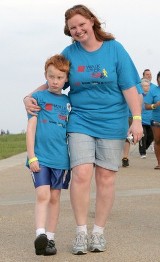by Jim Williams
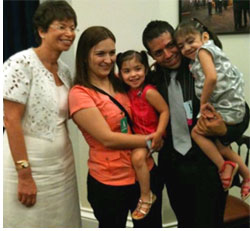 Yesterday was a very special day for three working families living with disabilities — and a special day for Easter Seals. Because it’s not every day you get an invite from the White House to meet with senior leadership to talk about the essential role Medicaid plays in the lives of children with disabilities and their families. But yesterday was that kind of day.
Yesterday was a very special day for three working families living with disabilities — and a special day for Easter Seals. Because it’s not every day you get an invite from the White House to meet with senior leadership to talk about the essential role Medicaid plays in the lives of children with disabilities and their families. But yesterday was that kind of day.
We arrived at the White House, on a very hot and steamy Washington morning, not knowing who we would meet. We were so excited when in walked President Obama’s Senior Advisor Valerie Jarrett. John Carson, Deputy Assistant to the President, Jeff Crowley, Senior Advisor on Disability Policy, and Kareem Dale, Special Assistant to the President were there too. How wonderful to be able to spend an hour with these leaders on an issue that’s so important for so many, and so timely given the country’s urgent budget and debt ceiling conversation.
Ms. Jarrett asked each of our families to tell their stories. Shannon Saunders Eaton and her mother, Roxanne, from Columbus Ohio, DeAnn and James Hunt from Little Rock, Arkansas, Rebeka and Chelsy Martinez and their parents, Joselyn and Jorge from McAllen, Texas, Easter Seals Chairman of the Board, Steve Rossman and his daughter, and a few of my Easter Seals colleagues helped to put a human face on what the program really does for millions of Americans. Ms. Jarrett instantly put everyone at ease and listened intently. The meeting was topped off when Shannon said “Medicaid saved my life, Easter Seals saved my life, Medicaid helped me prove the doctors wrong.”
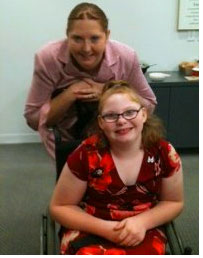 Valerie Jarrett told us that the President shares Easter Seals values that our country is about helping families do what’s right. She reaffirmed that the President shares our view that investments in Medicaid to help children get the services they need when they need them is a sound financial investment and that we all oppose block granting Medicaid and other measures that simply reduce benefits or reimbursement rates.
Valerie Jarrett told us that the President shares Easter Seals values that our country is about helping families do what’s right. She reaffirmed that the President shares our view that investments in Medicaid to help children get the services they need when they need them is a sound financial investment and that we all oppose block granting Medicaid and other measures that simply reduce benefits or reimbursement rates.
In subsequent meetings on Capitol Hill, our clients and their parents explained in very honest, personal and compelling ways how Medicaid changes lives for the better. You can read a little about Shannon, Al, Rebeka and Chelsy’s stories, too, and also check out a few photos of our day.
Each year, Easter Seals serves more than 1.2 million people with disabilities, all of whom will likely rely on the Medicaid program at some time in their lives. For more than 90 years, Easter Seals has been helping children with disabilities live, learn, work and play in their communities. These children have made tremendous gains because they have received the appropriate health services they needed at the time they were needed.
Several themes were raised throughout our time in Washington:
Medicaid allows kids with disabilities to be healthy, happy and independent. A girl needs physical therapy to help stave off the retraction of muscles that often accompanies cerebral palsy. It’s not unusual for a child with cerebral palsy to need physical therapy every week. However, too many private health insurance plans have arbitrary limits on physical therapy services, such as limiting a child to 12 sessions per year. After the 12 visits have been exhausted, families will realize that paying out of pocket to continue therapy is something that they simply cannot afford.
Medicaid allows parents of kids with disabilities to work. Yesterday, our families confirmed that as a result of the gains their children have made because of services paid for by Medicaid, parents can work outside the home for pay.
Medicaid is the only health insurance plan that has the comprehensive benefits that meets the needs of each child with a disability. Children with disabilities need access to the specific services currently available under Medicaid. The basic structure of Medicaid must be maintained.
Finally, Medicaid has already been cut and children with disabilities will be harmed by additional cuts to benefits or provider reimbursement rates. States have already cut Medicaid spending, by eliminating benefits and cutting reimbursement to providers. In many communities, the reimbursement rate is so far below the actual cost of a service making it extremely difficult for providers to continue to serve Medicaid enrolled children.
I encourage you to lend your voice to this critical discussion, too. Please share your experiences with Medicaid with your Members of Congress. Help us put a face on this vital program — your stories, along with Shannon, Al, Rebeka and Chelsy’s can make such a difference and really have an impact, not only on today’s budget decisions, but the future of millions of families living with disabilities.
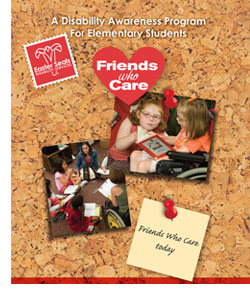 Yikes! Is it almost August already? Next thing you know, the kids will be back in school!
Yikes! Is it almost August already? Next thing you know, the kids will be back in school!






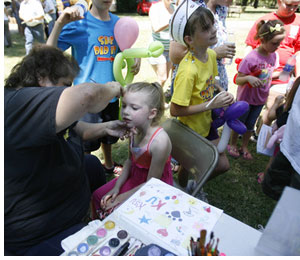 Last Thursday was proclaimed
Last Thursday was proclaimed  Yesterday was a very special day for three working families living with disabilities — and a special day for Easter Seals. Because it’s not every day you get an invite from the White House to meet with senior leadership to talk about the essential role Medicaid plays in the lives of children with disabilities and their families. But yesterday was that kind of day.
Yesterday was a very special day for three working families living with disabilities — and a special day for Easter Seals. Because it’s not every day you get an invite from the White House to meet with senior leadership to talk about the essential role Medicaid plays in the lives of children with disabilities and their families. But yesterday was that kind of day. Valerie Jarrett told us that the President shares Easter Seals values that our country is about helping families do what’s right. She reaffirmed that the President shares our view that investments in Medicaid to help children get the services they need when they need them is a sound financial investment and that we all oppose block granting Medicaid and other measures that simply reduce benefits or reimbursement rates.
Valerie Jarrett told us that the President shares Easter Seals values that our country is about helping families do what’s right. She reaffirmed that the President shares our view that investments in Medicaid to help children get the services they need when they need them is a sound financial investment and that we all oppose block granting Medicaid and other measures that simply reduce benefits or reimbursement rates.